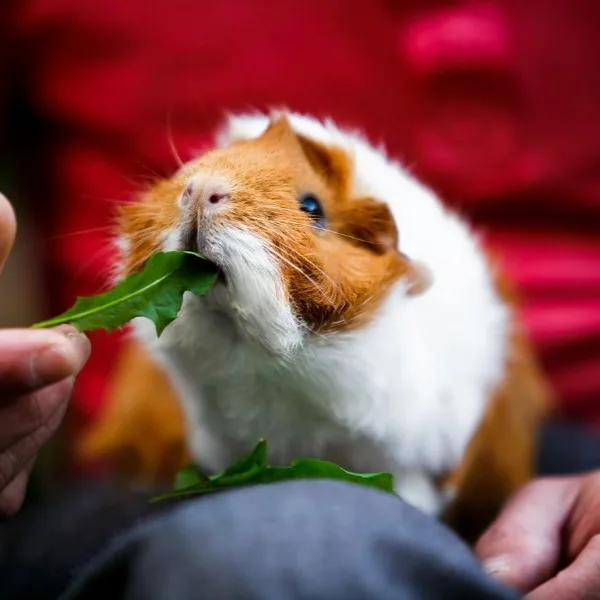Guinea pig care
The essentials to ensure your guinea pig remains in good health. Always seek veterinary advice if you are concerned about your pet.
Guinea pigs make great pets when cared for correctly and are provided with everything that they need to thrive. Guinea pigs are very dependent on their owners and need lots of daily care and attention. They can live for up to 4 to 9 years and therefore are a long-term commitment.
Guinea Pigs should be kept in pairs or in a group as they have very strong social instincts and can become depressed if living alone. The best group is one male to many females (however the male must be neutered). Female only groups also work well, whereas male groups are more rare due to hormones leading to issues with aggression. Male only pairs work best if both males are neutered and the bonding process is taken slowly.
Guinea pigs should not be housed with rabbits as rabbits have a powerful kick that can kill a guinea pig and can also show other aggressive behaviours. Rabbits also carry Bordetella (a respiratory infection) which is fatal to a guinea pig if caught. They also need different diets and cannot communicate with each other which makes for a lonely existence for them both.
Housing
It is important to consider your guinea pig accommodation carefully. If housing guinea pigs outside its important they are in a dry and warm environment with no draughts. An outside guinea pig hutch should be no smaller than 4ft by 2ft (1.25m x 1m) and have access to an exercise area no smaller than 6ft x 4ft (2mx1.25) This is the recommended size given by the Rabbit Welfare Association. Its important to also include lots of places for them to hide and snuggle in, such as boxes and tunnels, having these will also help to keep them warm. Guinea Pigs like to stay active so adding enrichment to their accommodation will also help to keep them happy and occupied.
When keeping guinea pigs indoors, they will still need a minimum space of 4ft by 2ft (1.25m x 1m) and plenty of opportunity to come out and run around. Guinea pigs need a quiet stress-free environment so it’s important to keep them in a part of the house that suits this. They can also suffer from heat stroke so should not be kept next to a radiator, as temperatures above 26 degrees can cause this.
Handling
As guinea pigs are prey animals, handling can easily scare them. When handling Guinea Pigs it is important that they are supported and cradled into the body to keep them as safe as possible.
To create a better bond with your guinea pig sitting with them and letting them to come to you will allow them to trust you more. If children are handling Guinea pigs its important to do this on floor level so they are kept close to the ground.
Diet
As guinea pigs can’t produce their own vitamin C its important to feed them good quality guinea pig nuggets that contain the right amount of Vitamin C. Guinea Pigs should have the same percentage of food ratios as rabbits. This percentage is 85% hay and grass, 12% veg and 3% pellets. When selecting veg for your guinea pigs it’s important to make sure that it’s safe for them, ideally include bell peppers as they hold extra vitamin C. You should be extra safe when giving guinea pigs Kale and spinach as they are high in calcium which can lead to bladder issues such as stones and sludge.
Veterinary care
Guinea pigs do not require any vaccinations and most vets will only neuter male guinea pigs as the procedure is high risk for females.
It is important to keep an eye on your guinea pigs’ nails and coat condition, also checking them regularly for mites or bald patches. Consult your vet should you have any concerns.
It’s good practice to take your guinea pigs to the vets once a year to for an annual check-up, they will also be able to look in their mouths properly to check their teeth and assess the general condition of your guinea pigs to give you any advice you might need.

